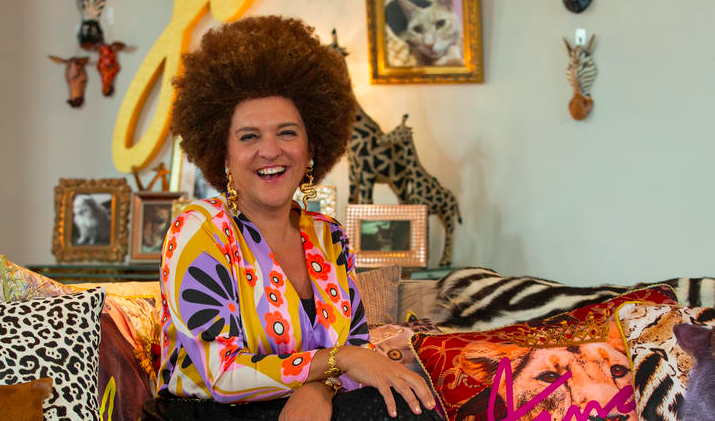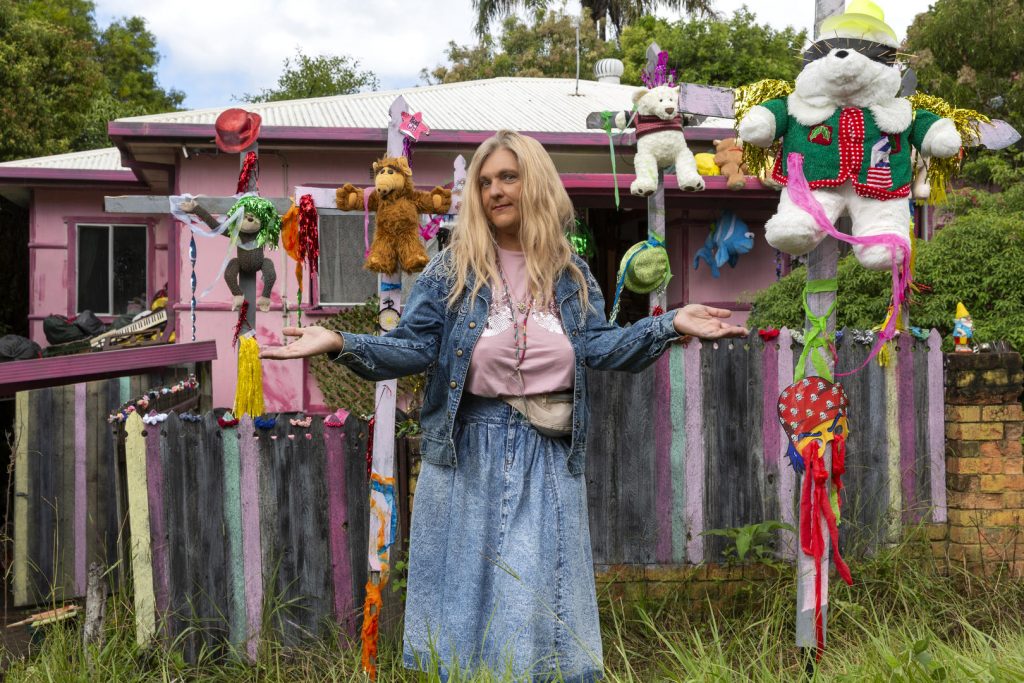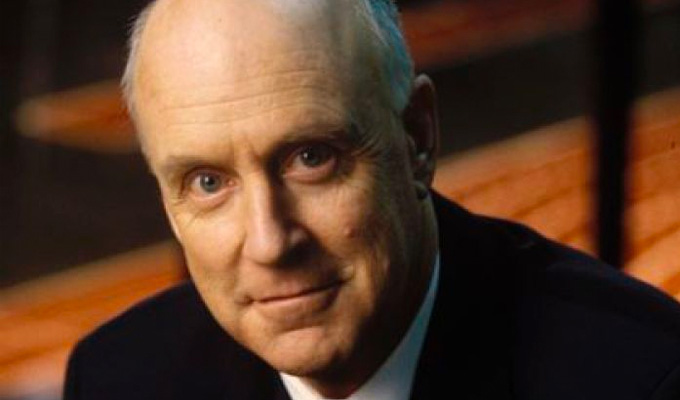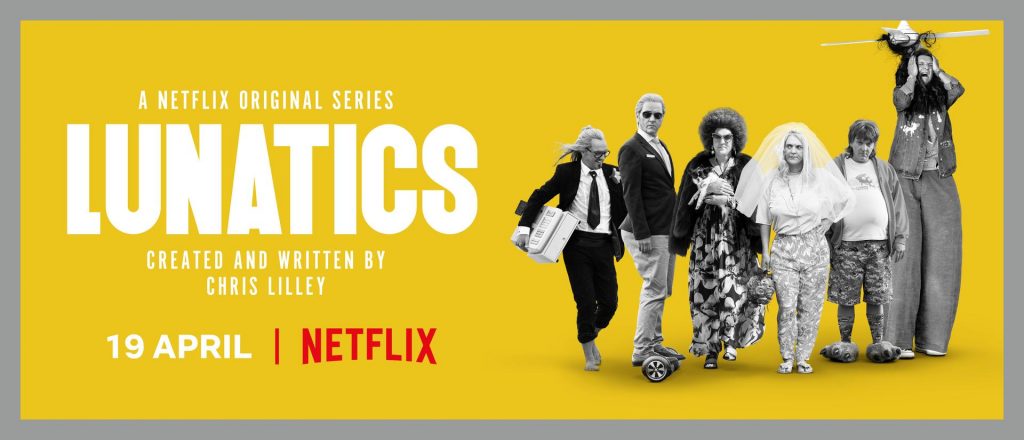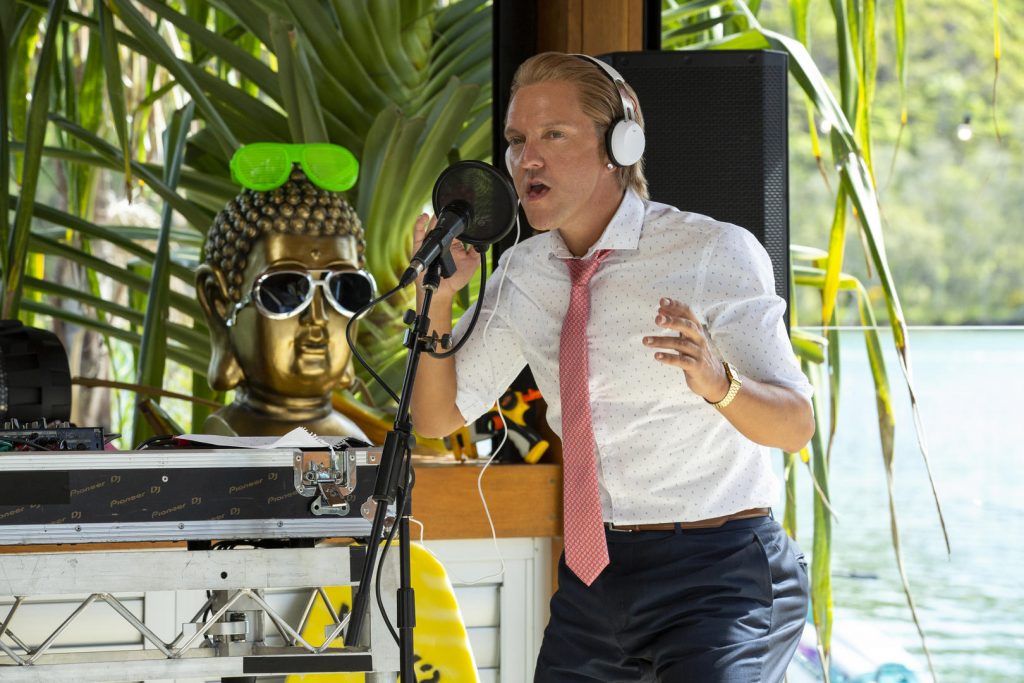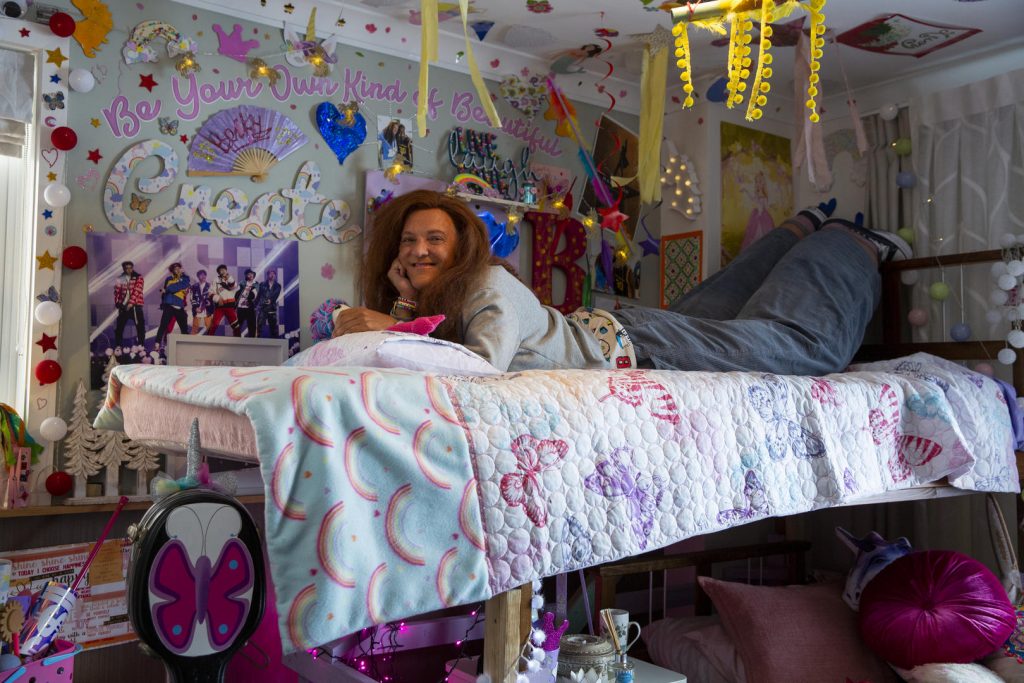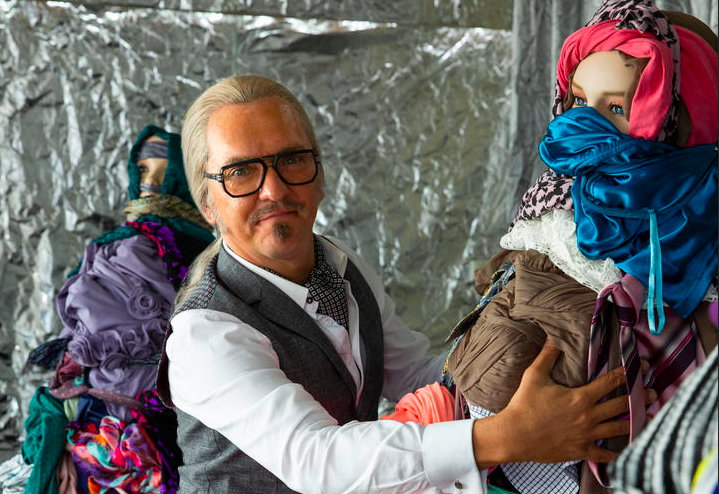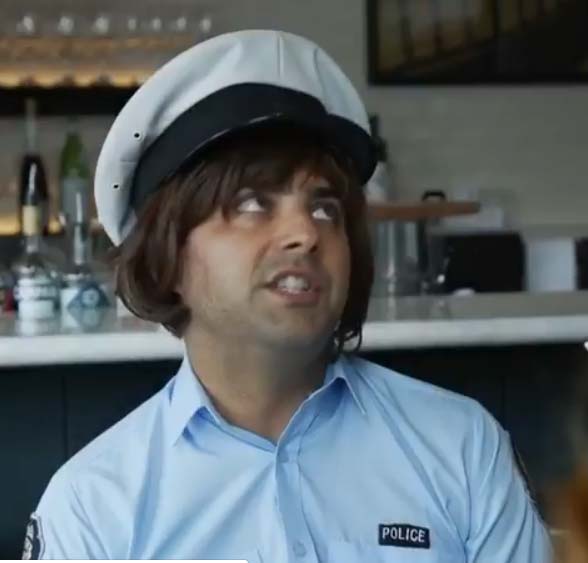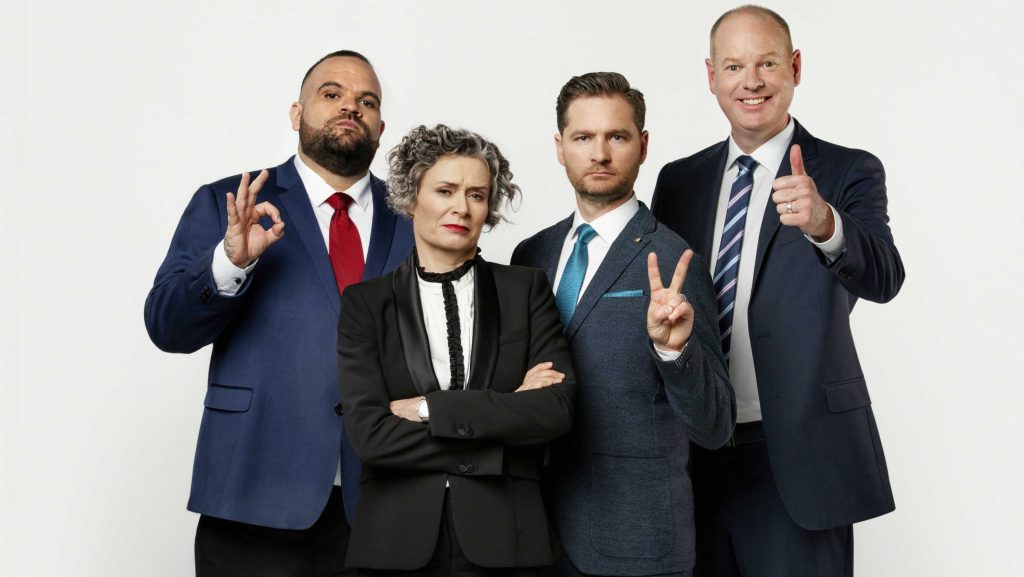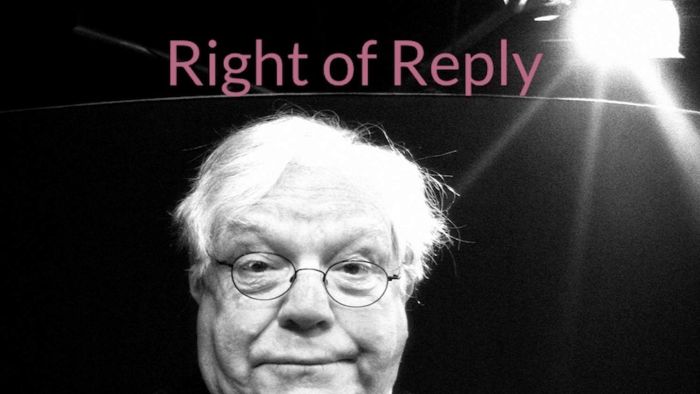Australian Tumbleweeds
You’d Have to be a Lunatic…
If there’s one thing we have to thank Chris Lilley for, its opening our eyes to the way the Australian media works. It was obvious to us when Angry Boys launched that Lilley was a performer with no new ideas, a man seemingly content to do the exact same material – material lifted from one of the nation’s grottier playgrounds at that – again and again and again and… you get the idea. Surely our nation’s media would point this out? Surely just being a Logie winner with a smash hit series under his belt didn’t put him above serious criticism when his work was so clearly flawed?
Ahahaha what fuckwits we were. Film criticism might be about slagging off overseas crap and theatre criticism might be about making everyone feel like they’re not wasting their lives, but television criticism is about “supporting the local industry”, and that made Lilley above reproach even when he was out there trying to make “sneaky nuts” a thing. He made a show where he played a character – in blackface – taking a shit on a police car: turned out the real outrage was that that ABC forgot to nominate it for the Logies.
Chris Lilley and dozens of his fans are angry boys and girls after the ABC forgot to submit the artist’s comedy TV series Angry Boys for the publicly voted section of the Logies.
Bet that “dozens” still burns.
Of course, that’s all in the past now, right? Lilley’s steady downward spiral hit rock bottom around the time of Jonah from Tonga, and now he’s about as likely to get a good word in the local press as the dad from Hey… Dad! is to get a comeback tour. But there is one lone voice willing to call out Chris Lilley’s name in defense of the comedy “provocateur”, and if you guessed this lone warrior was employed by Fairfax (now Nine), clearly you’ve read a newspaper in the last five years:
Chris Lilley is no stranger to controversy.
Some of his best-known characters – Tongan schoolboy Jonah Takalua, introduced in 2007’s Summer Heights High, and African-American rapper S.mouse, from 2011’s Angry Boys – drew widespread criticism after they were labelled “blackface”.
You know what? In 2019 we really don’t need the quotes around “blackface”. If Lilley was parodying a specific existing human being then maybe – maybe – there’d be room for discussion. But these were generic characters Lilley created on a comedy program for parody purposes: it’s blackface.
But amazingly, this article gets worse:
In the past, Lilley’s razor-sharp, sitting-on-the-line-in-the-cultural-sand characterisations have proven easy targets.
Pat Mullins, the housewife from Nollamara in Perth, Western Australia, who suffered from skeletal dysplasia of the femur – that is, one leg is shorter than the other, allowing her to “roll” in a straight line – was one of Lilley’s most loved characters.
The accusation critics would level at that performance – that it is “disability appropriation” – is hard to reconcile with the fact that Pat’s death was devastating, and that Lilley’s performance as the character was both nuanced and genuinely moving.
“Razor-sharp”? Remember that episode in Summer Heights High where Mr G took a shit on his classroom floor than blamed it on a down syndrome student to get them thrown out of his drama class?
More importantly, where exactly were the critics calling out We Can Be Heroes for “disability appropriation”? Turns out it happened once – two days before this article ran. And the point wasn’t “how did this awful We Can Be Heroes show get made” but “why is Chris Lilley’s tired old act still acceptable in 2019” – the article even says:
I used to watch and enjoy his shows years ago. I found some of We Can Be Heroes heartwarming. I thought that Summer Heights High was a clever insight into the stereotypes at high school.
And while we’re here, what does the “genuinely moving” death of a character have to do with anything? If Lilley dressed up in blackface and did an Stepin’ Fetchit routine, would tacking on a tragic death scene suddenly make it all better?
Similarly, the characterisation of Jonah Takalua was battered by accusations of “blackface” which, curiously, did not surface materially when we were introduced to the character in 2011 but took until 2017 to find momentum.
Fun fact: like it says at the start of this very article, Jonah debuted in 2007. Easy mistake to make – unless you’re writing about how social media has made Lilley’s brand of comedy a tough ask, in which case those four years makes a huge difference in social media terms.
Oh wait, no they don’t:
And what should we make of Lilley’s Ricky Wong, the Chinese physics student from We Can Be Heroes, who eschewed academic overachievement in favour of art, and took the role of Walkabout Man in the high school musical Indigeridoo.
To summarise: that’s a white man, playing an Asian kid, wearing indigenous face paint, playing an Aboriginal. How that didn’t turn into a tsunami of social media protest goes some way to explaining how flimsy and inconsistent such firestorms can be.
To summarise: Ricky Wong appeared in 2005’s We Can Be Heroes. The reason why there wasn’t a “tsunami of social media protest” is because there was no social media to protest on. Up next: we complain that the US Navy didn’t use their helicopter fleet to rescue passengers from the Titanic.
We could go on, but this whole fucking article is so stuffed with straw men we’d be here all week. If you’re a television critic – uh, “entertainment editor-at-large” – and you don’t realise that society has changed a lot since 2009 – you know, the year Sacha Baron Cohen’s Bruno was released, which might explain why there wasn’t a social media outcry over it either – then have fun calling things you don’t like “gay” a la South Park circa 2005.
Bizarrely, this entire article is defending Lilley against claims that his South African Lunatics character Jana was going to be yet more blackface when clearly the initial point of the character is that she might possibly be a blackface character. Why else make her South African? Shit, just look at the photo they released of her:
That’s Lilley walking right up to the line like he always does. Which this article says is a good thing:
It is true that Lilley is a provocateur. His art plainly hungers for both the endorsement of the cool kids at school and the opprobrium of their parents and teachers.
So if he’s just doing the kind of thing that’s central to his comedy, and if it’s part of what makes his comedy work, and if his comedy is “impactful” and “nuanced’ and “genuinely moving” because of it, then why feel the need to leap to his defense? Surely the virtues of his approach to comedy are self-evident?
Unless, of course, you know you’re talking shit.
Lunatics: the first two episodes
You’d have to think Netflix would be a little disappointed with Lunatics. Not because it’s crap, though it is: being an internet company rather than a broadcast channel, Netflix’s business model is all about getting you to watch rather than quality. They love grabbing up past-their-prime big names because the residual fame is enough to get people to try Netflix, and building a subscriber base is what they’re all about.
But Lunatics is crap in the most boring way possible; it’s just more of the same. Despite some pre-airing controversy aimed at the South African character Jan there’s no blackface, nor are there any amazingly outrageous antics that demand people sign up to check out all the fuss for themselves. Like every other Chris Lilley project since time began, it’s basically the same as every other Chris Lilley project since time began. It’s worse than rubbish: it’s boring.
You might have thought after the seemingly final flame-out of Jonah from Tonga that Lilley would have taken stock of his career and decided to try new things. If you were slightly smarter, you might have thought Lilley would maybe start to segue into doing his greatest hits – finally do that Mr G series, Summer Heights High The Next Generation, anything to make it clear that he was doing it “for the fans”. But why would an artist who’s never once changed his act start now?
So Lunatics is, if anything, building on the direction he was heading with his biggest flop Angry Boys: a group of unrelated characters doing the usual hilarious Chris Lilley stuff (you know, swearing). The six characters are both all-new and business as usual, their storylines are really just set-ups so Lilley can riff in-character, and each episode flows like molasses towards an ending that’s totally arbitrary. These are unpleasant people it’s a chore to spend time with: enjoy the next 360 minutes.
It’s almost impressive the way Lilley keeps managing to make “comedy” while having close to zero interest in developing an actual sense of humour. It’s fart jokes and bum jokes and poo jokes as far as the eye can see, and Netflix seems to have let him unlock the cupboard labelled “cunt” so look forward to that as a punchline as often as possible from multiple characters. A teen girl with giant legs moves into a dorm that has a (for her) head-high ceiling fan; while this amazingly dramatic situation is set up in episode one, don’t expect to be let off the edge of your seat any time soon.
And yet, if that was really all there was to this show, it’d be a lot more interesting – in a psychological study of its creator at least – than it actually is. Lilley will seemingly never work again with another writer and it’s well worth clicking on the “watch credits” button just to see how many times Lilley’s name appears (five? six?), but at least here he’s given almost all of his characters actual sidekicks to work with. They don’t get many lines and they’re all played by non-actors, but simply by having someone close by to react to their shitty antics the whole show edges just that little bit closer to comedy.
Also, there are brief, isolated moments that are funny. Lilley’s career has been ruined by his insistence that he do it all, because simply as a performer he remains a real talent and on the rare occasions here where his characters reveal a humanity that goes beyond being a fucking five star dickhead the show honestly doesn’t suck.
But there are maybe three minutes worth of those moments in the first 70 minutes and it feels like they happen almost by accident because pretty much all of this show feels like it happened by accident. Lunatics is, once again, the latest Chris Lilley show that feels like nothing so much as an excuse for Lilley to play dress-ups and talk about poo and bums while people whose wages he pays tell him he’s a genius.
Comedy is often an area where repetition thrives, but it’s hard to think of another comedian so committed to running the exact same joke into the ground on multiple occasions. It’s not even some timeless form of hilarity he’s working into the grave: character-based mockumentaries are over, being “outrageous” and “shocking” is old news, and everything else he has to offer most people outgrew by the time they were fifteen and stopped sniggering at the word “poo”. Lilley’s style of comedy is so old-fashioned now it’d feel stale even if he was a brand new talent pulling this shit for the very first time.
Of course, there has to be somebody somewhere who still finds Chris Lilley funny, so good news for them; they can simply go and dig up some of the many glowing reviews the early episodes of Angry Boys got and pretend they’re for Lunatics because based on what we’ve seen it is – and we just can’t say it enough – more of the same. That might be slightly embarrassing for the people who wrote those reviews, many of whom still work in the Australian media, but funny is funny; if they were laughing then, why aren’t they laughing now?
Oh right, because things change, tastes evolve, and people stop finding the same joke funny. If only someone could explain that to Chris Lilley.
Kicking An Own Goal
Press release time!
From Monday 6th May at 6.00pm
On ABC, iview and ABC COMEDY’s YouTube and Facebook pages.
Airing weekdays at 6.00pm on ABC TV and 8.30pm on ABC COMEDY until the Election on May 18th .
This year, ABC has been granted exclusive access to the Government Coach as he prepares his team for the biggest match of their career. In this gripping, fly-on-the-wall documentary series we follow the final two weeks of a dramatic season that’s already seen three captains, multiple injuries, and an Opposition hungry to win back the trophy. But with Scomo, Frypan, and Spud Dutton on his side, Coach is going to be giving it 110% right up until the final siren.
In 2018, Sammy J was given the honour of replacing the late, great John Clarke who together with Bryan Dawe provided their legendary satirical sketches for a generation. Viewers have since embraced the young, skinny political nerd, with ratings steadily increasing across the season – proving the old adage that “it’s not the size of the timeslot, it’s how you use it.”
In addition to broadcast, the show has found a huge audience online through its Facebook release, with episodes such as ‘Brexit Yoga’ and ‘Explaining Terrorism to Children’ racking up millions of views worldwide.
Sammy J and his co-writers Chris McDonald and James Pender strive to surprise viewers each week, with new characters and settings constantly evolving. One week Sammy J will be doing craft exercises in the Play School-inspired ‘Playground Politics’; the next he will be dressed as a sheep addressing his fellow cruise passengers on a Live Export boat.
Throughout it all, his breakout character ‘The Government Coach’ has been offering regular commentary on the state of his team – even turning up unannounced at Malcolm Turnbull’s final press conference to cheer on his captain.
Sammy J says: “Countdown to Glory is set to replace The Killing Season as the definitive Australian political documentary for a generation. We’ll be creating a brand-new episode every day for two weeks in the lead up to the election, based on the news of the day, which will be almost as stressful as trying to understand Bill Shorten’s negative gearing policy.”
Says the Government Coach: “Look I don’t normally like dealing with the maggots in the press gallery, but this is an important Grand Final, and I want to make sure the boys get full credit for their efforts.”
With an upcoming election and no shortage of controversies, 2019 is shaping up to be the satirical gift that keeps on giving.
Seems Sammy J is way more popular than the deafening silence that greets his sketches each week would suggest. Hey, it’s totally possible: people love characters, and even though The Government Coach usually seems like nothing more than a bunch of meaningless sports cliches applied to politics in such a way as to provide zero insight into either, who doesn’t love a footy coach?
Then again, having it pointed out that the vast majority of Australians – and pretty much 100% of the media – sees sport as far more important than politics is obviously a public service. After all, it’s impossible to imagine a popular series of sketches where a political fixer works behind the scenes to help a sporting team win… even if the vast amount of government cash poured into sporting stadiums across the country makes it pretty clear that’s something that really does happen.
Anyway, unless The Weekly really steps up during the election, this looks about as good as the ABC’s comedy coverage is going to get. Who doesn’t love democracy?
Yet Another Other Guy
Press release time!
SH!T HOT AUSSIE CAST JOIN FUNNY MAN MATT OKINE IN STAN ORIGINAL COMEDY SERIES
THE OTHER GUY SEASON 2
MATT OKINE & HARRIET DYER RETURN ALONGSIDE NEW CAST INCLUDING CLAUDIA KARVAN, LILY SULLIVAN, MATT DAY, BARRY OTTO AND YUMI STYNES
Harriet Dyer, Matt Okine, Lily Sullivan and Claudia Karvan for Stan Original Series THE OTHER GUY SEASON 2.
Claudia Karvan (Newton’s Law, Love My Way), Lily Sullivan (Romper Stomper, Picnic at Hanging Rock), Barry Otto (The Dressmaker, Strictly Ballroom), Matt Day (Wolf Creek, A Place To Call Home), Fiona Press (The Heights, Secret City), Elsa Cocquerel (Wolf Creek), feminist author Clementine Ford (Fight Like A Girl, Boys Will Be Boys) and media personality Yumi Stynes have jumped on board Season Two of the Stan Original Series THE OTHER GUY, created by and starring leading comedic talent Matt Okine.
With filming starting in Sydney, the new cast will join Okine as radio presenter AJ Amon, Harriet Dyer (No Activity, NBC’s upcoming The In-Between) as AJ’s best friend Stevie, Valene Kane (The Fall, Rogue One) as AJ’s ex Liv, Michael-Anthony Taylor (Pine Gap) as AJ’s Dad and Christiaan Van Vuuren (Soul Mates, Bondi Hipsters) as drug dealer Dezzy.
Written by Matt Okine, Kacie Anning (Fragments of Friday), and Becky Lucas, the new season is directed by Gracie Otto,best known for her critically acclaimed documentary The Last Impresario, who makes her TV directorial debut.
AJ Amon (Matt Okine) has lost everything – his house, his job, his best friend (Harriet Dyer) – and to make matters worse he’s just found out his ex-girlfriend (Valene Kane) is pregnant, and it may or may not be his. When a producer (Claudia Karvan) approaches AJ to make a TV show about his shitty life, he thinks he may finally have an opportunity to get back on top. But how do you make a show about your life without pissing off everyone in it? Will AJ use the show to get revenge on the people who wronged him or will reliving the past only keep him stuck there?
The funny, raw and poignant debut series about break-ups in the modern age received popular acclaim with Okine nominated for a rising star award at the AACTA Awards, while Junkee called it “Your new TV Show crush.”
Okay, so… if we wanted to find out the answers to “how do you make a show about your life without pissing off everyone in it?“, we should just watch the first season of The Other Guy? Because this sounds a lot like an origin story for the series itself, and considering the first season was… not good… a look at how the shit sandwich was made seems like the least attractive option when it comes to drawing a crowd.
But of course (okay, we’d totally forgotten until we went back and checked), the first series of this was also totally ripped from Okine’s life, being somewhat awkwardly based on a real-life break-up of his. Fingers crossed this gets a third season so he can finally cover that time he changed the expired milk in his fridge.
From the archives: A Royal Commission into the Australian Economy
Just over two years ago we lost John Clarke, if not the greatest satirist the Southern Hemisphere has ever produced then certainly in the top two. Clarke was best known for writing and starring in the sitcom The Games and for his weekly sketches with Bryan Dawe, but he did an awful lot of other great things too.
One near-forgotten Clarke classic is A Royal Commission into the Australian Economy, a satire on the economic recession of the late 80’s/early 90’s, written by Clarke with his The Games co-writer Ross Stevenson. A Royal Commission… was originally a stage production presented at the Belvoir Street Theatre and the Melbourne International Comedy Festival in 1991; it was then made into a TV show for Seven in 1993 starring some of the cast of Fast Forward.
With its in-depth, thoroughly researched and highly critical satirical analysis of government policy, the public service and business practices, A Royal Commission… is a world away from Seven’s typical comedy fare of the era. Sure, Fast Forward poked a bit of fun at the collapses of various banks and big corporations, and the then Labor government, but it tended to do so through the prism of pop culture parodies, like its version of Star Trek starring Bob Hawke and Paul Keating.
Other Seven comedies of the era, such as Acropolis Now, raised most of their laughs through crude stereotypes. Acropolis Now seemed like a revolutionary comedy, “holding up a mirror to multicultural society” as The Late Show laughingly put it, but it was more a re-working of Kingswood Country, Seven’s early 80’s family hit sitcom which featured a lot of gags about the Greek son-in-law (played by Lex Marinos). The re-working being that in Acropolis Now, the Greeks did the same Greek jokes but about themselves.
Comedy on commercial television in the early 90’s wasn’t exactly intellectual. Unless, of course, you tuned into A Current Affair on a Friday to see John Clarke and Bryan Dawe’s weekly sketch. You never saw Clarke & Dawe in Nine’s yearly network promo “Still the One!” but they were hugely popular and were a weekly feature on A Current Affair for eight years.
Even so, the idea of bringing a show like A Royal Commission into the Australian Economy to Seven would have been a bit daunting, hence the association with Fast Forward, the hugely popular sketch show starring Magda Szubanski, Jane Turner, Gina Reilly, Marg Downey, Michael Veitch, Steve Blackburn, Geoff Brooks, Gerry Connolly and Glenn Robbins, amongst others.
It’s also notable that A Royal Commission into the Australian Economy aired just eight days before Seven’s new sketch comedy series and successor to Fast Forward, Full Frontal began. Conceived when the Fast Forward team decided to disband after four exhausting years, Full Frontal featured a cast dominated by newer, slightly younger, and less well-known people, including Eric Bana, Greg Fleet, Matt Parkinson and a New Zealander called Rima Te Wiata.
The first series of the show is notable for being a sort of long, slow handover from the old Fast Forward cast to the new Full Frontal cast, with promotional material highlighting the fact that Fast Forward favourites like Michael Veitch and Marg Downey would be making cameo appearances.
This made a lot of sense: the Fast Forward brand was huge in the early 90’s and people would tune in to see the Fast Forward cast in just about anything. No wonder Seven marketed A Royal Commission into the Australian Economy as Fast Forward presents… A Royal Commission into the Australian Economy – the mere mention of Fast Forward was guaranteed to add hundreds of thousands to the viewing audience.
And, so, the mock trial that is A Royal Commission into the Australian Economy was chaired by Dame Victoria Market (Marg Downey), with Jane Turner as the Clerk, Glenn Robbins as a police constable, and Magda Szubanski, Gerry Connolly, Michael Veitch, Geoff Brooks and Steve Blackburn as various witnesses. And Gina Reilly outside the court reporting as Peter Harvey…Canberra. All of whom are great in it, by the way. The commercial reality of the need to associating this show with Fast Forward is one thing, but Fast Forward wouldn’t have become the powerhouse it became without its brilliant cast.
Magda Szubanski, for example, plays not only a minor Treasury official (male) and a courtroom cleaning lady, but also ACTU Secretary Bill Kelty (a man noted for his mad curly hair and distinctive Scottish-ish accent). Also in drag are Jane Turner as Laurie Oakes and Gina Reilly as Peter Harvey. Plus, Glenn Robbins plays President George Bush (senior), John Hewson and Derryn Hinch, Michael Veitch is both Paul Keating and Alan Bond – two rather different personalities – and Gerry Connolly pops up variously as Bob Hawke, The Queen, Prince Charles and, most brilliantly of all, Geoffrey Robertson.
If you’re familiar with Monty Python’s courtroom sketches, where literally anything can happen, this is what’s going on here. Only Frank Gallacher (All The Rivers Run, Cluedo and, later, Tangle) as Malcolm Turnbull (yes, the future Prime Minister but then high-profile lawyer Malcolm Turnbull) gives this any kind of reality.
And real it is, even with its ludicrous ending. Almost 30 years on, we’ve forgotten the impact of late 90s recession and many of those associated with it, but it was the Donald Trump or Brexit of its day, something which dominated the news, dragged on for months and years, changed the status quo and ruined a lot of lives. If you’re too young to remember it, lucky you, but if you lived through it and remember the key players, this is very much worth taking a trip down memory lane for.
It Don’t Matter If You’re Black or White
First, the good news:
Correcting some confusion – in the new show Lunatics, Chris Lilley is not portraying a woman of colour. When the series is released you will see that Jana is a white woman with huge 70s style curly hair.
— Laura Waters (@LauraWaters1) April 11, 2019
Then the bad:
Well, Meet the Fockers was a fair few years ago. And Kingswood Country was a few years before that. And All in the Family was even before that. So yeah, this probably does count as cutting edge Australian comedy.
At least they haven’t had to officially announce that nobody’s appearing in (Mr) blackface.
(Hopefully Not) Back in Black
We knew this day would come. We just hoped we wouldn’t be around to see it:
AUSSIE COMEDIC GENIUS CHRIS LILLEY IS BACK — AND HE’S SIX TIMES AS FUNNY
LUNATICS
LAUNCHES ON APRIL 19, 2019
ONLY ON NETFLIX
Lunatics Synopsis:
Lunatics is a 10-part comedy series presented as a documentary with the characters played by writer/creator Chris Lilley (Summer Heights High).
The documentary examines the lives of six extraordinary individuals and explores the idea that people are not what they seem at first. Through documentary interviews, self recorded and fly on the wall footage the six intriguing subjects are observed over a period of months. Their stories unfold with hilarious results. As eccentric and odd as they all are, they are scarily recognisable types and they teach us that its ok to just be you.
Character Descriptions:
Keith, a fashion retail veteran embarking on a new business venture who struggles with objective sexuality issues and his deep love for a cash register.
Becky, an extraordinarily tall University freshman embarking on life in an American college with her twin sister and dealing with social issues and life with massive legs.
Gavin, a confronting young boy and future Earl of an English country estate dealing with the pressures of his future and trying to be a kid.
Jana, a lesbian Pet Psychic to the Stars who from her South African home base struggles with an unrequited love for her personal assistant.
Quentin, an incompetent real estate agent about to inherit a family business who dreams of being a world-renowned DJ and street artist.
Joyce, an eccentric elderly ex porn star and hoarder who is now a recluse who obsessively collects things while facing an impending eviction.
That’s a lot to take in. But we know what you’re thinking: are any of them in blackface? That header image makes it hard to tell, but good news: there are pictures!
Jana!
Quentin!
Gavin!
Becky!
Keith!
And the hording former porn star! Where does he come up with these crazy – or should we say crazeeee – characters?
Okay, so none of them are in blatantly obvious blackface as far as we can tell… though Jana and Becky are definitely looking extremely borderline. But that’s not to say Lilley’s comedy won’t be getting a little dark. We just have one question*: when they say “AUSSIE COMEDIC GENIUS CHRIS LILLEY IS BACK — AND HE’S SIX TIMES AS FUNNY” what is he meant to be six times funnier than?
Because if it’s bowel cancer or a surprise firing at work, that’s a pretty low bar.
*edit* Oh joy, we found the trailer:
*we have so many questions
Cliff-edge comedy
Ryan Shelton’s Instagram serial Cliff returned for a third series last month and featured a whole bunch of celebrity guest stars.
In previous series, Shelton has played all or most of the roles – the show’s “hero” Cliff Schnitzel and Cliff’s on-again/off-again partner Rebrecca – but in this police-themed series there were appearances from Luke McGregor as a Desk Sergeant, Heidi Arena as The Chief, Clarke Richards as a waiter and Shelton (again) as hard-nosed detective Bobby Pong.
And character names like Bobby Pong weren’t the sum-total of the gags. Oh, no. Cliff 3 features silly wigs, over-the-top acting, and several dreadful puns. Basically, if you’re after a quick, uncomplicated laugh, you’re unlikely to find better on Instagram.
But why Instagram? Do Instagram users, who seem to mainly be interested in fashion, clean eating, hot bodies and Khardasians, want a very silly sitcom? We suspect that’s not really the point.
When Ryan Shelton started making Cliff, Instagram only allowed users to upload up to 15 seconds of video, and it seems that Cliff was a way for Shelton to experiment within the restrictions of the medium. But now that the maximum length of a video on Instagram is 60 seconds, what’s been the impact?
The short answer is not much, as most of the episodes run for about 15 seconds anyway. Which is probably a good thing because this is a show that would struggle to sustain itself if it went on for much longer.
Remember Danger 5? The parody of 1960s spy movies that for some unknown reason got 12 half-hour episodes and a whole heap of praise as a comedy? Its problem was that it barely had enough jokes about the 1960s spy movie genre to make one decent half hour of comedy, let alone 12. So, we’re glad that Ryan Shelton has had the good sense to confine Cliff to a small number of episodes on a platform where video content has to be short.
Imagine if each episode of Cliff went for half an hour? Or even 10 minutes. It would exhaust the audience with its relentless, trad gags, and, basically, become really, really annoying.
Understanding how to use the medium you’re working in, to your advantage, is the key difference between a comedy firing and not firing. And on Instagram, Cliff fires.
The Week(ly) Shall Rise
Ok, so you know how, week after week after week, we complain that The Weekly is the same old thing? This week they changed it. And in a development that shocked us to our very core, it actually made the show better. Who even knew such a thing was possible?
Yeah, maybe we should be a little less snarky when we’re trying to pay a compliment. Here’s how it broke down:
*Usual rubbish intro with that pointless checklist – ooh better not turn over before Pickering gets to Dog Anti-Vaxxers.
*A couple of middling Eddie McGuire jokes which were made worse by being back-to-back
*Press conference jokes! These are always gold… FOOLS GOLD that is #zing
*Judith Lucy Wellness Warrior. Nice work as always, only reason we’re still watching.
*Oh great, a bunch of clips from A Current Affair. Remember when The Chaser used to do this stuff and it was funny and had a point?
*Hang on… isn’t that Briggs? Sitting at the desk with Pickering? Did this ever happen last year?
*Briggs on a bike isn’t our favourite segment, but we’ll give The Weekly a thumbs up for it going into an election because having Briggs – a cast member who really only has this occasional segment – conduct the political interviews off the lot makes it almost possible to see the interviews as a separate thing that doesn’t taint the integrity of The Weekly. Not that it has much integrity to taint, but at least having the bits with politicians as an entirely separate thing handled by a solo cast member means they don’t feel quite so much like the show is cozying up to the people it should be making fun of.
*And it’s interview time. Hey, clips from Get Krack!n – oh, now the rest of The Weekly is going to look sad in comparison. Awww.
*Another shit clip joke bit. Ha ha, politicians have to say and do stupid stuff in locations they know little about because if they don’t the media won’t cover their policy announcements.
*Hard Chat. What’s left to be said about this segment that hasn’t been said about being buried alive in a landslide of shit?
*And… that’s it? The show’s over?
It turns out that all you have to do to lift The Weekly from a totally pointless show to an almost tolerable one is get rid of the extended news segment where Pickering “takes down” some tepid weeks-old issue that social media has already passed judgement on. Or get rid of Hard Chat / Tom Gleeson, because halfway through the main interview we started to wonder if he’d been cut and seriously, when you start to think there’s a good chance Tom Gleeson isn’t going to turn up watching The Weekly becomes a lot more pleasurable.
But of course, next week they won’t have a segment with Briggs they have to try and fit in and things will go back to usual. The Weekly clearly has problems that run bone-deep – the bits where they do snarky voice-overs over footage of politicians really need much smarter voice-overs to seem better than the time-fillers they currently come off as – but it’s depressing to realise how little needs to be done to make the show noticeably better.
Especially as, as Charlie Pickering reminds us at the end of every season, it’ll be back next year.
All the Sir Murray Rivers run
Almost two years after the untimely death of John Clarke, his long-time comedy partner Bryan Dawe is back doing a weekly satire segment on ABC radio as Sir Murray Rivers.
For many years, Dawe has been popping up on ABC Radio in the guise of Sir Murray Rivers, retired QC and stalwart of the Liberal party, but now his appearances are a weekly thing. The Overnights program is where you can hear Sir Murray’s Right of Reply live, or all the segments are available to download on the ABC website (search for Sir Murray Rivers for a list of them, as annoyingly they’re not all collated on one webpage).
Sir Murray Rivers won’t be to everyone’s taste – he’s a member of the Melbourne Club, who slurs his reactionary views into a tape recorder in between gulps of something decent from said Club’s cellar – and to describe him as “born to rule” would barely scratch the surface, but he’s an interesting voice to hear never the less.
Put it this way, if you’re old enough to remember the 1999 Republic Referendum then Rivers was the sort of well-heeled chap who’d appear in TV debates as a spokesman (and they were almost all men) for Australians for a Constitutional Monarchy. He’d be the one saying what a “splendid woman” The Queen is. And that would be his entire argument for not voting for a republic.
It was hard to believe that such posho anachronisms hadn’t been parachuted in from an aristocratic fox hunt somewhere in England, let alone that they were Australian-born and lived among us, but they were. Oh yes. And they’re still here, occupying wing-back chairs in inner-city members clubs, sitting on the boards of some of this country’s most profitable enterprises, and discretely pulling the levers of the Liberal Party in their own self-interests. They are the literal equivalent of Labor’s faceless men, except that no one in the media ever seems to mention them. Presumably, because they own most it.
But if you want to know what they’re up to, Right of Reply will tell you. In Sir Murray’s missives so far, we’ve heard about his work at the Centre for the Retention of the Monarch and on the United Nations Year of the Inside Trader. Plus, he’s got views on the environment and Malcolm Turnbull, and some tips on tax avoidance and investment opportunities.
Right of Reply is a different style of satire to Clarke & Dawe – more in the mould of Barry Humphries’ Sir Les Patterson – but it’s every bit as cutting.

